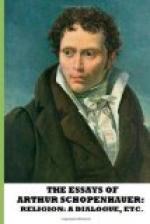Philalethes. And to see the effects one need only compare antiquity with the Middle Age; the time of Pericles, say, with the fourteenth century. You could scarcely believe you were dealing with the same kind of beings. There, the finest development of humanity, excellent institutions, wise laws, shrewdly apportioned offices, rationally ordered freedom, all the arts, including poetry and philosophy, at their best; the production of works which, after thousands of years, are unparalleled, the creations, as it were, of a higher order of beings, which we can never imitate; life embellished by the noblest fellowship, as portrayed in Xenophen’s Banquet. Look on the other picture, if you can; a time at which the Church had enslaved the minds, and violence the bodies of men, that knights and priests might lay the whole weight of life upon the common beast of burden, the third estate. There, you have might as right, Feudalism and Fanaticism in close alliance, and in their train abominable ignorance and darkness of mind, a corresponding intolerance, discord of creeds, religious wars, crusades, inquisitions and persecutions; as the form of fellowship, chivalry, compounded of savagery and folly, with its pedantic system of ridiculous false pretences carried to an extreme, its degrading superstition and apish veneration for women. Gallantry is the residue of this veneration, deservedly requited as it is by feminine arrogance; it affords continual food for laughter to all Asiatics, and the Greeks would have joined in it. In the golden Middle Age the practice developed into a regular and methodical service of women; it imposed deeds of heroism, cours d’amour, bombastic Troubadour songs, etc.; although it is to be observed that these last buffooneries, which had an intellectual side, were chiefly at home in France; whereas amongst the material sluggish Germans, the knights distinguished themselves rather by drinking and stealing; they were good at boozing and filling their castles with plunder; though in the courts, to be sure, there was no lack of insipid love songs. What caused this utter transformation? Migration and Christianity.




